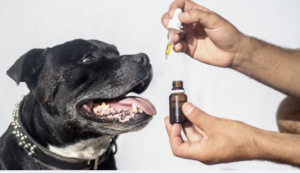CBD Vets Australia offers peace of mind to veterinarians and pet owners alike, who now have a legal pathway to access CBD products that are pure and have undergone stringent pharmaceutical quality testing. These are not to be confused with hemp seed oil products, for reasons we explain here!
In recent years, there has been a rapid expansion in the amount of medicinal cannabis products for pets that is now available. And as a veterinarian, you may have had pet owners raise questions about hemp seed oil and CBD oil. These two terms are often used interchangeably, making it difficult to discern their differences and benefits for our pets.
Prescribing quality legal CBD oil for pets with confidence
Hemp seed oil and CBD oil are not the same thing, yet inconsistencies in labelling and marketing can make the differences challenging to discern for consumers. Veterinarians are understandably concerned about owners sourcing products online that are not tested for quality, and which may put their pet’s health, or life, at risk.
The good news is that CBD Vets Australia offers peace of mind to veterinarians and pet owners alike, who now have a legal pathway to access products that are pure and have undergone stringent pharmaceutical quality testing.
Hemp seed oil: what your pet owners should know
Hemp seed products have been legal as a food in Australia since 2017. The seeds are known to be a good source of:
- Protein
- Fibre
- Essential fatty acids: Omega 3, 6 and 9
Hemp seed containing treats, toppers and pet foods are becoming more readily available at pet stores and through online retailers. While these nutrient-dense seeds can offer health benefits for dogs as part of a nutritious diet, it is not the same as CBD oil, which is a medical preparation.
It’s important for vets and owners to know that hemp seed products don’t have high enough concentrations of the cannabinoid CBD to deliver the therapeutic effects associated with medicinal cannabis therapy.
Therapeutic use of CBD oil
CBD, also known as cannabidiol, is a primary phytochemical or cannabinoid found in the cannabis sativa plant. CBD is non-intoxicating and does not elicit the same “high” as THC.
Unfortunately, many CBD products available online are not assessed for the purity of their cannabinoid content. Preparations marketed online as ‘pure’ CBD oil may in fact contain impurities and various other substances which may be toxic to pets, such as heavy metals, chemicals and pesticides. For veterinarians and pet owners alike, this is highly concerning given the risk of adverse effects associated with using these untested products.
The health benefits of CBD for pets
CBD oil has been shown to have numerous benefits in humans, which has spurred on the exploration of its clinical application in veterinary medicine. The three key areas where CBD oil may help pets are:
- Epilepsy
- Osteoarthritis
- Chronic pain
Epilepsy is the most well-known condition where CBD may provide relief. In humans with treatment-resistant epilepsy CBD oil has shown significant reductions in seizure frequency. The same goes for our canine friends, where CBD has exhibited a 33% reduction in seizure frequency in epileptic dogs.
CBD has also been researched for its positive effects on osteoarthritis in dogs. Researchers have hypothesised that it is due to its anti-inflammatory action that CBD has been shown to improve mobility and progressively reduce symptoms.
Given its anti-anxiety and antioxidant effects observed in humans, the momentum gained in the arena of CBD for pets, plus a little anecdotal evidence from pet owners, we may soon see CBD be used more widely in pets with anxiety, skin or sleep disturbances.
As veterinarians, it is difficult and distressing to see traditional treatments fail to control a patient’s symptoms or improve their quality of life – and that’s when CBD may be a viable alternative therapy to explore.
Safety and side effects of CBD
CBD appears to have a well tolerated safety profile for dogs with careful dosing, under the strict supervision of a trained vet. If you are unsure of dosing, CBD Vets Australia can assist with information. The most common side effect for dogs taking CBD is loose stools, though this is recorded infrequently and can be managed by a “start low and go slow” dosing regimen.
So far there has been little clinical research for CBD in cats. Cats appear to react differently to cannabinoid medicines than dogs, commonly resulting in increased head shaking or licking.
Please contact us on [email protected] or (02) 8294 9303 if you would like more information or training in prescribing legal CBD for pets.







